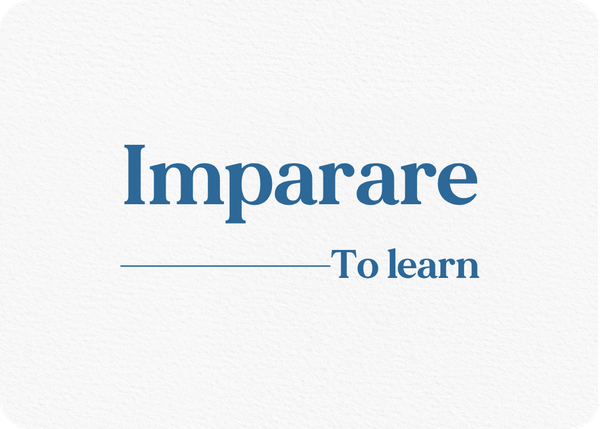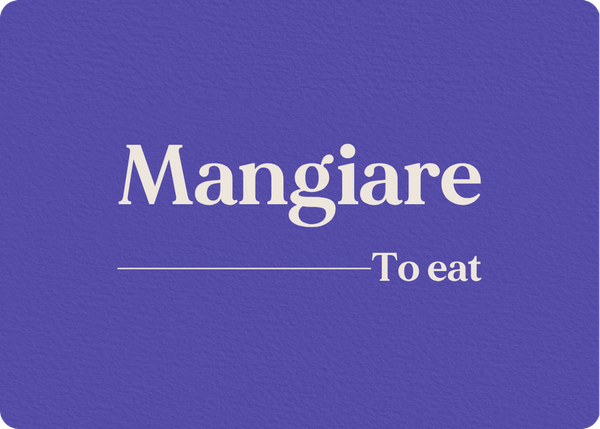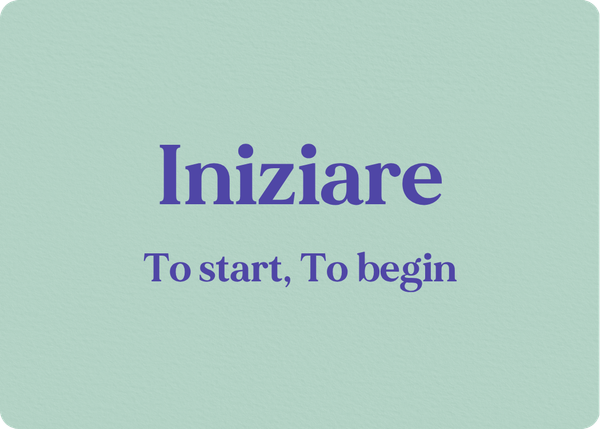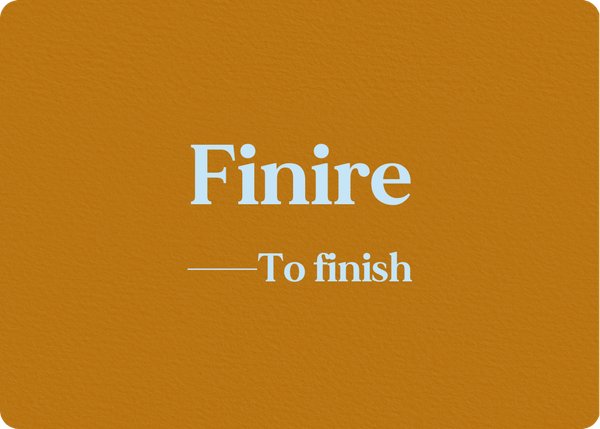What is Imparare?
Imparare is an Italian verb meaning "to learn", "to learn how to", or "to master". It belongs to the first conjugation (-ARE verbs) and follows regular conjugation patterns. This verb is useful for expressing the learning process, the acquisition of new skills, and the development of knowledge and abilities.
Key Features of Imparare:
- Type: Regular first conjugation verb (-ARE)
- Meaning: To learn, to learn how to, to master
- Auxiliary verb: Uses "avere" (to have) for conjugation in compound tenses
- Past participle: Imparato
Indicativo – Indicative Mood
Presente (Present Tense)
| Persona | Coniugazione |
|---|---|
| io | imparo |
| tu | impari |
| lui/lei | impara |
| noi | impariamo |
| voi | imparate |
| loro | imparano |
Example:
Imparo sempre molto dai miei genitori.
I always learn a lot from my parents.
Passato Prossimo (Present Perfect)
| Persona | Coniugazione |
|---|---|
| io | ho imparato |
| tu | hai imparato |
| lui/lei | ha imparato |
| noi | abbiamo imparato |
| voi | avete imparato |
| loro | hanno imparato |
Example:
Ho imparato a nuotare quando avevo 7 anni.
I learned to swim when I was 7 years old.
Imperfetto (Imperfect)
| Persona | Coniugazione |
|---|---|
| io | imparavo |
| tu | imparavi |
| lui/lei | imparava |
| noi | imparavamo |
| voi | imparavate |
| loro | imparavano |
Example:
Da bambino imparavo molto velocemente.
As a child, I used to learn very quickly.
Trapassato Prossimo (Past Perfect)
| Persona | Coniugazione |
|---|---|
| io | avevo imparato |
| tu | avevi imparato |
| lui/lei | aveva imparato |
| noi | avevamo imparato |
| voi | avevate imparato |
| loro | avevano imparato |
Example:
Non avevo mai imparato una lingua straniera prima.
I had never learned a foreign language before.
Passato Remoto (Simple Past)
| Persona | Coniugazione |
|---|---|
| io | imparai |
| tu | imparasti |
| lui/lei | imparò |
| noi | imparammo |
| voi | imparaste |
| loro | impararono |
Example:
Mio nonno imparò il mestiere da suo padre.
My grandfather learned the trade from his father.
Trapassato Remoto (Past Anterior)
| Persona | Coniugazione |
|---|---|
| io | ebbi imparato |
| tu | avesti imparato |
| lui/lei | ebbe imparato |
| noi | avemmo imparato |
| voi | aveste imparato |
| loro | ebbero imparato |
Example:
Dopo che ebbe imparato la lezione, non ripeté mai più l'errore.
After he had learned the lesson, he never repeated the mistake again.
Futuro Semplice (Simple Future)
| Persona | Coniugazione |
|---|---|
| io | imparerò |
| tu | imparerai |
| lui/lei | imparerà |
| noi | impareremo |
| voi | imparerete |
| loro | impareranno |
Example:
Imparerete molto da questo viaggio.
You will learn a lot from this trip.
Futuro Anteriore (Future Perfect)
| Persona | Coniugazione |
|---|---|
| io | avrò imparato |
| tu | avrai imparato |
| lui/lei | avrà imparato |
| noi | avremo imparato |
| voi | avrete imparato |
| loro | avranno imparato |
Example:
Alla fine del corso, avrò imparato tutto il necessario.
By the end of the course, I will have learned everything necessary.
Congiuntivo – Subjunctive Mood
Presente (Present Subjunctive)
| Persona | Coniugazione |
|---|---|
| che io | impari |
| che tu | impari |
| che lui/lei | impari |
| che noi | impariamo |
| che voi | impariate |
| che loro | imparino |
Example:
È importante che tu impari bene la grammatica.
It's important that you learn grammar well.
Passato (Past Subjunctive)
| Persona | Coniugazione |
|---|---|
| che io | abbia imparato |
| che tu | abbia imparato |
| che lui/lei | abbia imparato |
| che noi | abbiamo imparato |
| che voi | abbiate imparato |
| che loro | abbiano imparato |
Example:
Credo che Paolo ormai abbia imparato a gestire la situazione.
I believe Paolo has now learned how to handle the situation.
Imperfetto (Imperfect Subjunctive)
| Persona | Coniugazione |
|---|---|
| che io | imparassi |
| che tu | imparassi |
| che lui/lei | imparasse |
| che noi | imparassimo |
| che voi | imparaste |
| che loro | imparassero |
Example:
Saremmo molto contenti se tu imparassi a suonare il violino.
We would be very happy if you learned to play the violin.
Trapassato (Past Perfect Subjunctive)
| Persona | Coniugazione |
|---|---|
| che io | avessi imparato |
| che tu | avessi imparato |
| che lui/lei | avesse imparato |
| che noi | avessimo imparato |
| che voi | aveste imparato |
| che loro | avessero imparato |
Example:
Se Flavio avesse imparato a guidare, ora sarebbe più indipendente.
If Flavio had learned to drive, he would be more independent now.
Condizionale – Conditional Mood
Presente (Present Conditional)
| Persona | Coniugazione |
|---|---|
| io | imparerei |
| tu | impareresti |
| lui/lei | imparerebbe |
| noi | impareremmo |
| voi | imparereste |
| loro | imparerebbero |
Example:
Imparereste meglio con più pratica.
You would learn better with more practice.
Passato (Past Conditional)
| Persona | Coniugazione |
|---|---|
| io | avrei imparato |
| tu | avresti imparato |
| lui/lei | avrebbe imparato |
| noi | avremmo imparato |
| voi | avreste imparato |
| loro | avrebbero imparato |
Example:
Avremmo imparato di più se il corso fosse stato migliore.
We would have learned more if the course had been better.
Imperativo (Imperative)
| Persona | Coniugazione |
|---|---|
| (tu) | impara |
| (lui/lei) | impari |
| (noi) | impariamo |
| (voi) | imparate |
| (loro) | imparino |
Example:
Impara dai tuoi errori!
Learn from your mistakes!
Indefinite Moods
Infinito (Infinitive)
- Presente (Present): imparare (to learn)
- Passato (Past): avere imparato (to have learned)
Examples:
Voglio imparare a ballare il tango.
I want to learn to dance tango.
Dopo aver(e) imparato le basi, è diventato tutto più facile.
After learning the basics, everything became easier.
Participio (Participle)
- Passato (Past): imparato (learned)
Example:
La lezione imparata ieri è stata molto utile.
The lesson learned yesterday was very useful.
Gerundio (Gerund)
- Presente (Present): imparando (learning)
- Passato (Past): avendo imparato (having learned)
Examples:
Imparando una cosa nuova ogni giorno, a poco a poco migliorerai.
By learning something new every day, little by little you will improve.
Avendo imparato quella tecnica, poté aiutare gli altri.
Having learned that technique, he/she was able to help others.
The verb Imparare at a glance: Key tenses you need
| Present | Present Perfect | Imperfect | Present Subjunctive | Imperfect Subjunctive | Present Conditional |
|---|---|---|---|---|---|
| io imparo | io ho imparato | io imparavo | che io impari | che io imparassi | io imparerei |
| tu impari | tu hai imparato | tu imparavi | che tu impari | che tu imparassi | tu impareresti |
| lui/lei impara | lui/lei ha imparato | lui/lei imparava | che lui/lei impari | che lui/lei imparasse | lui/lei imparerebbe |
| noi impariamo | noi abbiamo imparato | noi imparavamo | che noi impariamo | che noi imparassimo | noi impareremmo |
| voi imparate | voi avete imparato | voi imparavate | che voi impariate | che voi imparaste | voi imparereste |
| loro imparano | loro hanno imparato | loro imparavano | che loro imparino | che loro imparassero | loro imparerebbero |
Conclusion
Mastering the conjugation of "imparare" is useful for expressing learning, skill acquisition, and knowledge development in Italian. As a regular first conjugation verb, it follows standard patterns throughout all tenses.
Remember the key points:
- Uses "avere" as auxiliary verb in compound tenses
- Regular first conjugation verb (-ARE) with standard patterns throughout all tenses
- Past participle is "imparato"
- Essential for describing the learning process and acquiring new skills
Keep practicing with real sentences and contextual examples to master this fundamental Italian verb!





